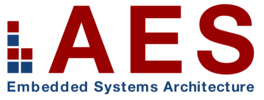Architektur Eingebetteter Systeme (AES)
Das Fachgebiet Architektur Eingebetteter Systeme (AES) beschäftigt sich in Forschung und Lehre mit allen Bereichen der Rechnerarchitektur, von energieeffizienten Systemen bis hin zu massiv parallelen Hochleistungsrechnern.
Der Schwerpunkt liegt auf Entwurf und Implementierung hochperformanter, eingebetteter Systeme, bei denen Anwendungsanforderungen mit neuartigen Architekturen optimal in Einklang gebracht werden sollen.
Wir befassen uns auch mit der Steigerung von Energieeffizienz, Programmierbarkeit, Vorhersagbarkeit und Fehlertoleranz moderner Prozessorarchitekturen.
Standort
Kontakt
| Einrichtung | Architektur Eingebetteter Systeme |
|---|---|
| Sekretariat | EN12 |
| Gebäude | E-N |
| Raum | E-N 645 |
| Adresse | Einsteinufer 17 10587 Berlin |
| Sprechzeiten | nach Vereinbarung |

 © Ulrich Dahl
© Ulrich Dahl
